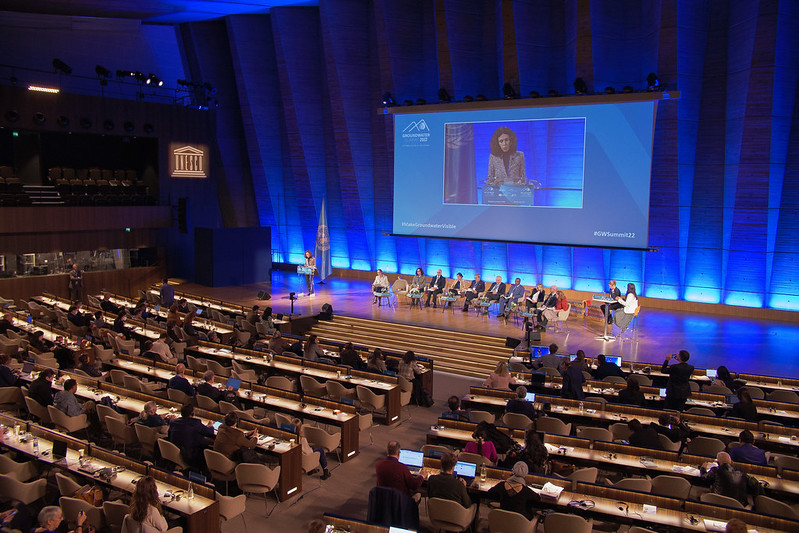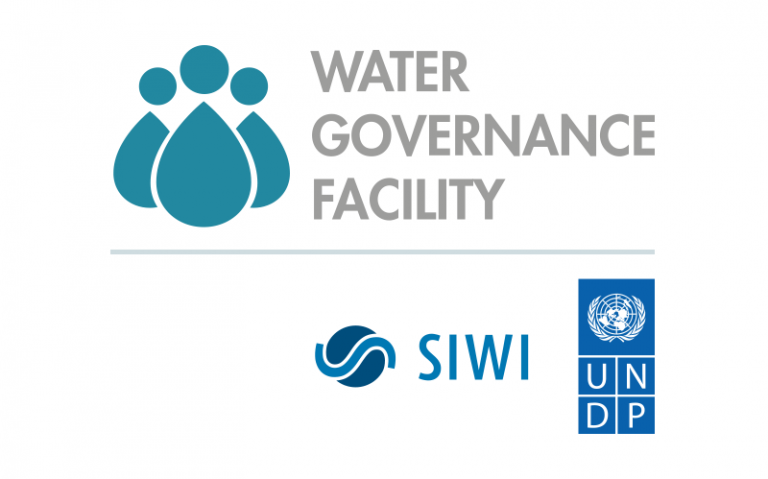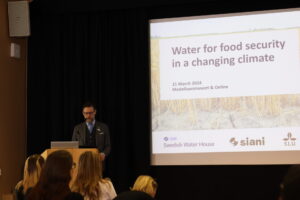Groundwater Summit 2022: The culminating event of the UN-Water year to make the invisible visible
The UN-Water Summit on Groundwater, a high-level conference on the world’s largest liquid freshwater resource, puts a spotlight on groundwater’s crucial role for achieving SDG 6 and other interlinked goals.
 Tanja Miškova, Ambassador-at-Large for Water Diplomacy, MoFa Slovenia, speaking at the Governance session of the Groundwater Summit. From: Natural Sciences
Tanja Miškova, Ambassador-at-Large for Water Diplomacy, MoFa Slovenia, speaking at the Governance session of the Groundwater Summit. From: Natural Sciences The Summit featured a pre-summit event on 6 December followed by a day of official sessions dedicated to the five accelerators listed in the SDG 6 Global Acceleration Framework: Data and information, Capacity development, Innovation, Finance, and Governance. It was coordinated by UNESCO-IHE and the International Groundwater Resources Assessment Centre (IGRAC), with UNDP–SIWI as part of the Task Force and held in Paris on the 6–8 December 2022.
The UNDP–SIWI Water Governance Facility coordinated the Governance session, the third in a series of events that began with an online session at the World Water Week in Stockholm (Governing groundwater: Achieving the SDGs through accelerating inclusion and participation, see video below), and continued with a side event at the Summit (Adaptation and flexibility in the context of groundwater governance and the SDGs – the case of food security). These were co-organised by UNDP, SIWI, IWRA, IW:LEARN, UNESCO, and the Ministry of Foreign Affairs, Government of Slovenia.
SIWI’s Dr Jenny Grönwall wrote the Summit’s official overview of Groundwater governance, depicting how this should be conceptualized along with a state of the topic in relation to the achievement of SDG 6.
“This overview provides a definition that distinguishes groundwater governance from groundwater management,” says Jenny Grönwall. “This draws on how the 2022 UN World Water Development Report, and the multi-stakeholder Groundwater Governance Project before that, frames governance as being about the decision-making processes, law and policy, planning and outcomes at different levels of the administration. In short, governance is much about the enabling environment. In comparison, management of groundwater and aquifers involves decisions on permits, practical implementation activities, and day-to-day operations of facilities and infrastructure. Both parts are needed to protect groundwater.”
When the SDG 6 Global Acceleration Framework was launched as part of the “Decade of Action” to catalyse individual and collective efforts to achieve SDG 6, it was stressed that the Governance pillar offers opportunity for further empowerment of users, practitioners, and civil society. Indeed, when it comes to water, Jenny Grönwall highlights that in being ‘multi-levelled,’ governance involves a diversity of actors with different degrees of power, influence, and knowledge – from the international, regional and national, down to the most local level where we find the well or borehole owners.

Jenny Grönwall’s contribution to and participation in the Summit was supported by the International Centre for Water Cooperation (ICWC) and the UNDP–SIWI Water Governance Facility.
Therefore, groundwater governance is unique in that it comprises specific arrangements, usually between the different users and local authorities, at the aquifer or basin scale. These can include social norms and local practices of individual households and farmers with own wells for domestic, irrigation, and other uses. At this level are also communities in charge of a drinking water supply and/or groundwater irrigation systems, and private sector companies.
Inclusivity is a guiding principle of the UN-Water Global Acceleration Framework and critical to groundwater, which is a uniquely local resource. “Stakeholder participation is also recognised as a principle characterising ‘good’ governance,” Jenny Grönwall reminds, “and ensuring meaningful involvement in public decision-making is, to a certain degree, legally binding on governments under international law.”
The Overview also summarizes the progress on achieving the different targets under SDG 6. For instance, it has been reported by UN-Water the world is not on track to achieve the indicator for integrated water resources management (6.5). The operational arrangements for transboundary basins target (6.5.2) monitors existence of a joint body; regular, formal communication between riparian countries; joint or coordinated management plans or objectives; and regular exchange of data and information. All those components are essential for cooperation over transboundary aquifers and important features of groundwater governance. For this target there are several UN bodies – including UNECE, UNESCO, and IGRAC – as well as organisations and scholars engaging in furthering the cause.
The Groundwater Summit offers important messages to the Mid-Term Review Conference in New York on 22–24 March 2023, to inspire and influence decisions taken ahead of it and as part of the Conference.







